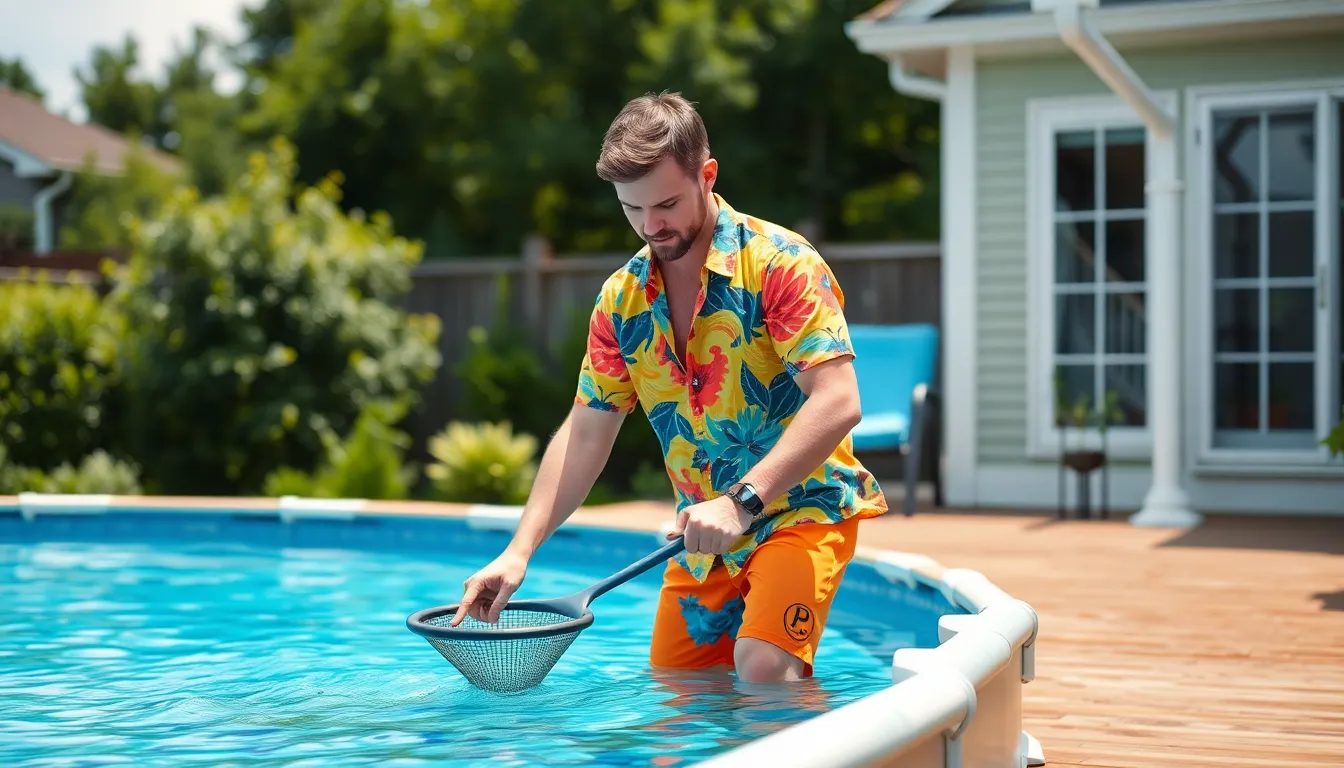Summer’s here, and that shiny above ground pool is calling! But before diving into those refreshing waters, it’s time to tackle the not-so-glamorous side of pool ownership: maintenance. Sure, nobody dreams of scrubbing walls or testing water chemistry, but a little effort now means endless splashes later.
Table of Contents
ToggleImportance Of Above Ground Pool Maintenance
Proper maintenance of above ground pools prevents water quality issues and keeps swimmers safe. Regular cleaning eliminates debris and avoids algae growth, which can pose health risks. Maintaining the correct chemical balance in the water also enhances the pool’s longevity, reducing the need for costly repairs.
Timely checks of pool equipment ensure efficient operation. Inspecting pumps and filters routinely can prevent breakdowns and extend their lifespan. Sufficient filtration plays a critical role in keeping water clean and clear, making swimming more enjoyable.
Routine maintenance prevents costly repairs down the line. Addressing small issues promptly helps avoid larger, more expensive problems later. A well-maintained pool maintains its aesthetic appeal and offers a comfortable swimming environment.
Seasonal maintenance tasks contribute greatly to the overall quality of the pool experience. Winterizing and preparing the pool during the off-season protects it against weather-related damage. Regular inspections and maintenance throughout the year ensure a swift opening when summer approaches.
Ultimately, prioritizing maintenance fosters a safe and enjoyable swimming space for family and friends. Dedicated care creates an inviting atmosphere that encourages frequent use. With these practices in place, pool owners can enjoy the best above ground pool experience possible.
Essential Tools For Pool Maintenance

Maintaining an above ground pool requires specific tools to ensure cleanliness and safety. These essential tools make the job efficient and effective.
Skimmers And Nets
Skimmers and nets play a vital role in pool maintenance. They easily remove leaves, insects, and debris from the water surface. Using a skimmer net allows for quick cleanup, preventing buildup that can affect water quality. Regular use of these tools helps maintain a clear and inviting swimming area. Swimmers appreciate clean water free from floating debris, contributing to a positive pool experience.
Brushes And Vacuums
Brushes and vacuums provide deeper cleaning for above ground pools. Brushes effectively scrub the pool walls and floor, targeting algae and dirt buildup. Employing a vacuum helps remove debris settled at the bottom, ensuring all areas are clean. An efficient vacuum system connects to the pool’s filter and aids in maintaining optimal water clarity. Consistent use of these tools promotes proper maintenance and helps extend the lifespan of the pool.
Routine Maintenance Tasks
Routine maintenance tasks keep an above ground pool clean, safe, and enjoyable throughout the summer. Performing these essential activities consistently makes a significant difference in overall pool quality.
Water Testing And Balancing
Testing water chemistry requires regular attention. Test strips or liquid kits measure pH, chlorine, and alkalinity levels, ensuring they remain within safe parameters. Maintaining a pH level between 7.2 and 7.8 prevents irritation for swimmers and allows disinfectants to work effectively. Adjustments may involve adding chemicals like pH increaser or decreaser, along with algaecides when necessary. Chlorine levels should stay between 1-3 parts per million (ppm); this balance protects both swimmers’ health and pool equipment. Regular water testing promotes clarity and cleanliness, enhancing the swimming experience.
Cleaning The Pool Surface
Cleaning the pool surface involves removing debris like leaves, bugs, and dirt that accumulate daily. Utilizing a skimmer net removes larger items and helps maintain visual clarity. Brushing the walls and floor every week prevents algae growth and keeps surfaces smooth. Vacuuming the pool weekly targets dirt that settles at the bottom, ensuring all contaminants are addressed. Clean surfaces contribute to a more inviting swimming area and improve overall water quality. Consistent cleaning habits maintain a polished appearance, enhancing enjoyment for all users.
Filter Maintenance
Filter maintenance ensures efficient water circulation and optimal cleanliness. Regularly inspecting filters reduces the risk of clogs and breakdowns. Cartridge filters require cleaning every 2-4 weeks by applying a hose to remove debris. Sand filters typically need backwashing every 4-6 weeks to improve water flow. Checking the pump for blockages also supports efficient operation, maintaining a steady water flow. Staying on top of filter care prevents costly repairs and extends the life of pool equipment. An effective filtration system creates a safer, more appealing swimming experience.
Seasonal Maintenance Tips
Seasonal maintenance ensures an above ground pool remains in top condition year-round. Various tasks are vital for optimal performance and longevity.
Preparing For Winter
Winterization prevents damage from freezing temperatures. First, remove all pool accessories and clean the surfaces. Next, drain water from the pool, ensuring it’s below the skimmer. Adding winterizing chemicals minimizes algae and bacteria growth during cold months. Cover the pool securely, using a winter cover to block debris and reduce maintenance efforts when spring arrives. Regular checks of the cover and surrounding area during winter can prevent issues.
Spring Start-Up
Spring start-up marks the return to swimming season. Begin by uncovering the pool and inspecting for any damage. Clean the pool thoroughly, removing debris and brushing the walls. Test water chemistry immediately; adjust pH levels to reach between 7.2 and 7.8 for optimal conditions. Run the filter continuously for at least 24 hours after adding chemicals, ensuring proper circulation. Throughout the season, monitor water quality and adjust as needed to maintain a safe swimming environment.
Common Problems And Solutions
Above ground pools often encounter issues that require prompt attention. Uneven water levels can create skimming problems. Ensure even distribution by checking the pool’s foundation and adjusting the water level as needed.
Algae growth poses another common challenge. Regularly testing water chemistry can help prevent this. Maintaining pH levels between 7.2 and 7.8 helps inhibit algae, while using proper sanitizers aids in effective prevention.
Cloudy water frequently signals an underlying problem. Inadequate filtration or improper chemical balance usually causes this. It’s advisable to check the filter frequency and clean or replace cartridges as necessary to enhance filtration efficiency.
Equally important, leaks can lead to significant water loss. Inspecting hoses and connections routinely can identify potential leaks early. Applying a pool patch or calling a professional can effectively resolve these issues.
Filtration system malfunctions also occur occasionally. If the pump struggles to maintain flow, assessing the pump’s operation may reveal clogs or damaged parts. Cleaning out debris can restore functionality swiftly.
Debris accumulation is another issue. Surface skimmers and nets help eliminate leaves and insects. Cleaning the pool’s surface regularly ensures a clear and inviting swimming area.
Temperature imbalances can affect the swimmer’s comfort. Heating systems often fail when maintenance is neglected. Scheduling regular checks allows for quick repairs and ensures a pleasant swimming experience.
Properly addressing these common problems enhances the enjoyment of an above ground pool. Regular monitoring and maintenance practices will contribute to a safe and enjoyable swimming environment throughout the season.
Maintaining an above ground pool is vital for ensuring a safe and enjoyable swimming experience. By committing to regular cleaning and water testing, pool owners can prevent common issues and enhance water quality. Utilizing the right tools makes routine maintenance easier and more effective.
Seasonal tasks like winterization and spring start-up are equally important for protecting the pool from damage and preparing it for use. Addressing potential problems early on helps maintain the pool’s aesthetic appeal and functionality. Prioritizing these maintenance practices not only fosters a welcoming environment for family and friends but also maximizes the longevity of the pool, making every summer a memorable one.



